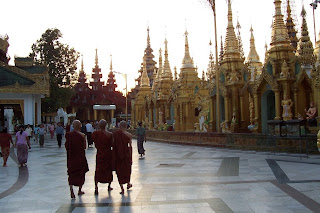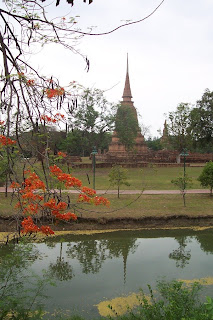
T.S. Elliot must have had the weather in mind when he wrote that "April is the cruelest month". Temperatures in Myanmar soar into the mid-forties. Regular power outages all over the country render not only the air-conditioning useless, but also the overhead fans, and refrigerators. I've spent hours wandering the sunny streets desperately searching for a cold drink, sadly longing for ice-cubes only having to settle for yet another warm glass of imitation Burmese Coca-cola. There is no respite from the heat.
Until the water festival.
The Buddha couldn't have been more merciful in setting up his New Years celebration in the middle of April: a time when we are told to wash away the sins of last year with a bucket of cool water, so we can begin our next year of debauchery cleansed and refreshed. In the past, this meant three days of daintily pouring perfumed water from a small silver bowl on friends and neighbors. Unfortunately, things have gone sadly downhill in modern times. Maybe it's global warming. Today's Buddhist New Year Festival is a ruthless ten day water war waged all over the country, with next year's debauchery getting a formidable head start.
 |
Girl dancers in traditional clothing line up with silver bowls of perfumed water for the opening ceremony in Yangon.
|
Nu took us to Yangon's New Year's opening ceremony. Along the way, small children and gangs of adorable young street kids asked us respectfully if they could please pour a bit of water on us. The chance to pour water on a white backpacker was an opportunity so exciting and novel it never failed to illicit shrills of enjoyment. We were only too happy to oblige. Behind them, however, their older siblings prepared more formidable instruments of water warfare. Their hungry smiles were laced with menace. They wanted nothing more than to wipe out all traces of last year's sins. However, for now, tradition protected us. They would have to hold their fire until after the opening ceremonies.
 |
During the opening ceremony, a line dance of men and women gracefully poured water on each other.
|
Without the foggiest clue what was going on, a few police kicked several old ladies out of their plastic toy chairs, and we were ushered to sit in their places. Sweating profusely in our stinky Teva sandals and the same Nepal Trekking shirts we had been wearing for the last six months, we found ourselves in the seat of honour next to Yangon's City Mayor and some of Myanmar's most famous young film talents. In a pathetic and hopeless attempt to look important, we tried to chat with our Burmese-speaking neighbours until the opening ceremony began: a kind of dance and theater show that looked suspiciously like last night's strip-tease.
 |
Burmese film stars looking cool for the water festival.
|
Among other Burmese celebrities, we ran into Mo Win, a world-famous photographer now living in Yangon. He and his French wife invited us for a ride in the back of their white pickup truck to see the water festival at nearby Inye Lake. Along the way, we picked up a few more Americans and squeezed together in the back. The opening formalities were over, and it wasn't long before we were assaulted by gangs of water throwing, whisky-swilling hooligans dressed up like British punk rockers.
The water fight had begun, and foreigners were not exempt. Indeed, we soon discovered that a clunky old pickup truck full of white-faces was considered a unique find and a primary target deserving special attention. While the morning's cute kids with cups of water were all in good fun, now that their older siblings had taken over it became a dangerous sport. Though previously impossible to find, garbage pales of freezing cold ice water now seemed to be everywhere, their contents pumped out at us with painfully high-pressure fire hoses. As our truck skidded down the windy roads, every turn was manned by adolescents with exotic water guns whipping us with buckets of high velocity ice water of questionable purity.
 |
A pickup truck full of Indian immigrants preparing for an ambush. Ear protection is of paramount importance when attacked with a fire hose.
|
Mercifully, Mo Win ground his aging white pickup to a halt outside his gorgeous mansion. Soaking wet, freezing cold, and covered in red fire-hose-induced welts, we piled out of the back and ran through his gates to safety. Within minutes, we were in the serenity of his grassy yard, underneath the shade of his giant mango tree, eating its fruit freshly picked and prepared by his servants. Moments later, a couple more of his Burmese employees produced copious amounts of food, cool frothy mugs filled with beer, and a bottle of quality French wine.
"It's safe in here, we can talk." Interestingly, he was referring to a draconian law in Myanmar prohibiting groups of more than five people meeting together for discussion, rather than the ruthless gangs of water throwing Burmese punkers outside.
`
Mo Win is on his third marriage to a much younger French girl. He has to "upgrade" every few years, in his own words. With a long dark mane of black hair he looks young for his years, and likes nothing more than the sound of his own voice; fortunately for him, he does exude a certain charm. He summarizes life under the regime like this:
"We live our lives, and the government officials live theirs. We don't really mix. My art isn't political and I don't involve myself in politics. If I did, I'd be counting beads." The Lady, Aung San Suu Kyi, is one of his biggest fans and the NLD once asked him to photograph her. "I told them to stuff it ! Are they crazy !?", he exclaimed, "I'd be counting beads !"
The Burmese have mastered the art of Asian collective resourcefulness. In their close-knit community, everyone knows a friend of a friend to get things done. As a gifted photographer who lived most of his life in France, Mo Win is a bit of a foreigner in his own land. His son once chastised him for being too honest on his tax returns, and demanded he get a local to do it properly. The Americans we picked up study Buddhism and do volunteer aid work. Locals help them to stay in the country for prolonged periods by arranging them business visas through a fake company.
 |
Our gang gearing up for another forray: stuffing our valuables into water-tight ziplock bags and applying another coating of water-proof sunscreen.
|
Mo Win insisted we finish our drinks and set off once more, determined to show us the water festival at Inye Lake. We crowded back into the pickup truck, our ranks now swelling to include several of Mo Win's Burmese wine-pouring coolies and a couple of bottles of scotch. As the truck rounded each corner, cries of "Happy New Year" were followed by such a relentless barage of water balloons, ice buckets, and fire hoses we'd periodically lose passengers out the back.

Inye Lake turned out to be the main front in Yangon's water battle: a chaotic honking gridlock consisting of bumper-to-bumper pickup trucks carrying a cargo of water guns, hoses, and comatose old men still clutching emptied bottles of Jack Daniels. Through the polluted haze of low-grade Russian diesel exhaust, a motley crew of revelers held hands with green-haired teenagers dressed in studded leather and Union Jacks, dancing in the flooded streets to the rhythm of Burmese covers of Western Hip-hop. A virtual monsoon of water rained down from large wooden structures temporarily constructed to cater to throngs of Burmese kids who had paid good money to dump tanks of ice water and fire riot-pressure water hoses into the chaos below them.

Our rusty old pickup broke-down along the way so I had to jump out of the truck and push. The Yangon sewage system was overwhelmed by the deluge, and I splashed down into a knee deep river of chocolate water carrying past a detritus of mixed filth in its formidable current. With the men out of the truck, the two girls were exposed and abondoned in the back.
If the exotic site of a pickup truck full of white foreigners induced shrieks of enjoyment, cries of laughter, and buckets of ice water, the dream-like scene of two white girls in wet T-shirts dancing on a truck induced instant euphoria in the general vicinity. While two of Mo Win's coolies poured copious quantities of scotch down my throat, I caught a glimpse of an entire block of fire-hoses beaming down on Katlijn as she desperately swam across a pool of rank liquid spilling out of the back of the pickup in muddy cascade of garbage.

Other events that evening were so surreal I'm not sure anymore whether they actually happened or were some water-logged product of my inebriated and over-stimulated brain. I seem to recall a midget Asian rapper busting out a Burmese translation of government censored Eminem lyrics flanked by a troupe of background dancers that included a seven-foot albino giant break-dancing with an afro-wig. It was like a David Lynch film on crack.
`
Sometime late that night, we finally made it back to our certified non-government operated hotel room for a cold shower and a non-functioning air-conditioner. Maybe it was just an emotional release during a week's time when the junta relaxes its grip and it temporarily becomes socially acceptable to make a complete ass of yourself, or maybe it is just a lot of experience with riot police. Whatever it is, the Burmese really know how to throw a good water fight.





































